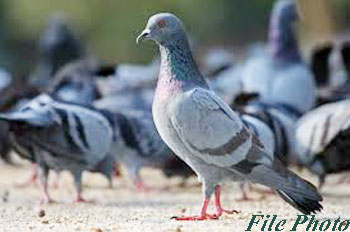PUNE, February 19: Unchecked growth in the population of pigeons in the city that provides ample food and nesting sites is becoming a cause for concern, experts say pointing out that the bird droppings are a potential health hazard.
“In the wild, raptors prey on pigeons and smaller birds, keeping their population in check. However, in urban areas there are no predators for these birds and there is no biological control over their populations. So the birds have been proliferating,” said ornithologist Umesh Vaghela.
Founder of Ela Foundation Satish Pande pointed out that the blue rock pigeons most commonly seen inside the city have a long association with humans and the relationship has evolved since ancient times.
In the wild, their natural nesting sites were rock cliffs and mountains. These birds are highly adaptive and modern urban spaces with tall buildings that offer artificial cliffs suit them well, Pande explained.
Moreover, the practice of feeding birds, often attached with religious sentiments, ensures that the birds have plenty to eat in the cities. When the birds are assured of a regular food supply, they tend to breed at an accelerated rate causing population numbers to rise considerably, Vaghela said.
In certain parts of the city, pigeon-fighting and pigeon-flying are still common. These are instances where domestic and feral pigeons can mix and transmit diseases to one another. Such practices should be strictly banned, Pande added.
The rise in pigeon population is a major cause for worry because of the severe impact it can have on human health.
“Once the bird droppings dry up, they spread in the air like dust. They contain microorganisms and antigens that can induce a condition called hypersensitivity pneumonitis. Because there is so little awareness about this condition, it usually goes undiagnosed and untreated for long periods of time,” said Sundeep Salvi, principal of the Chest Research Foundation.
Salvi said that the symptoms of hypersensitivity pneumonitis include a chronic cough that refuses to go away and a tightening sensation in the chest. No amount of antibiotics or cough syrups will be effective in curing the cough and it would require high doses of oral steroids to treat it, he said.
“Unfortunately, many doctors are also not aware about the fact that it can be caused by pigeon droppings and an accurate diagnosis cannot be done. Even chest X-rays are not very specific and it requires CT-scans to make an accurate diagnosis,” he said.
Salvi said that greater awareness was the only way of dealing with the problem since there really aren’t many precautionary measures that can be undertaken.



